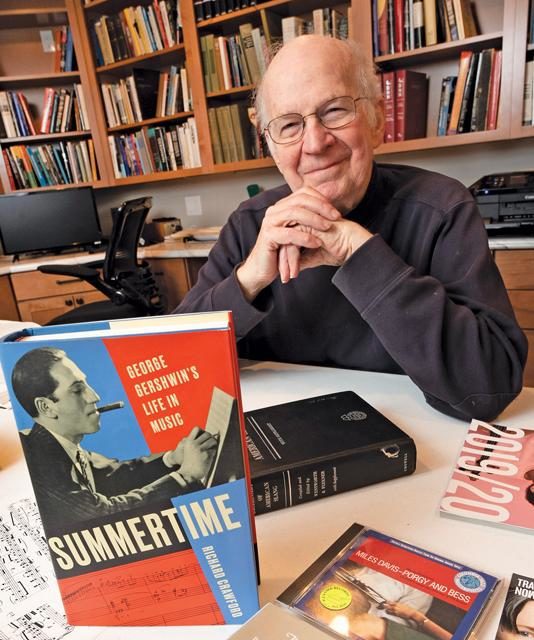That’s what Rich Crawford’s grandson wanted to know when he heard about the retired U-M music prof’s newly published biography Summertime: George Gershwin’s Life in Music.
Crawford joked that it might have been even longer, but “I ran out of gas.”
Asked if he remembers the first time he heard the Gershwin song that gave the book its title, Crawford laughs, “I’ll be damned if I know.
“I started as a half-ass saxophonist when I was in high school in Detroit. I was in a combo that played a lot of dances, but ‘Summertime’ wasn’t part of our repertoire.”
But it’s a perfect metaphor for a composer who died young. “‘Summertime’ is the ideal word for his life,” Crawford says. “Once the summertime of his life was over, that was it–that was all the time he had.”
Crawford came to Ann Arbor to study engineering at the U-M in the late 50s, but after a couple years switched to his first love, music–not as a sax player but as a musicologist in the new field of American music.
“I was looking for a dissertation subject in 1961, and it turned out the Clements Library on South University had a wonderful collection of colonial and early American materials,” he says. That led to a career as a U-M music prof. He’s also a past president of the American Musicological Society, a founding member of the Society for American Music, and the founder and former editor-in-chief of Music of the United States of America.
Before Summertime, he wrote a history of American music called America’s Musical Life. “I thought the next thing should be some composer, and there were two composers who really needed a biography,” he says. “One was Duke Ellington, and the other was Gershwin.
“I choose Gershwin. I worked on it for the better part of ten years.”
One of the book’s felicities is its easy familiarity with its subjects. He calls the Gershwin brothers “George” and “Ira” while the Astaire siblings are “Fred” and “Adele.” Speaking of Fred’s first dance partner, how did Crawford know what to explain to contemporary audiences about lives lived nearly a century ago? “I was a teacher of American music for forty years,” Crawford laughs, “and I sort of know!”
Crawford isn’t done with music. “I don’t feel like I’ve retired. I’ve got a whole lot of stuff in my library, especially jazz. That’s what I’m looking at now.” It’s not too late for Ellington.
But his time with Gershwin was unforgettable. “I felt that to be spending my days in the company of this person was a blessing,” he says. “I often told myself ‘you’re a lucky guy to be writing this, and you want to be worthy of it.'”


